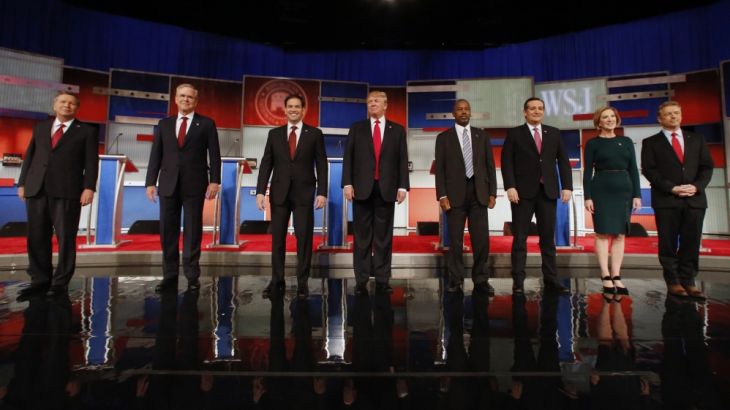Republican hopefuls split on foreign intervention, ISIL
Candidates spar over China, Russia, and how to deal with ISIL in new round of debates held in state of Wisconsin.

Republican presidential candidates in the US have taken part in a new round of debates ahead of the party’s primary elections due to be held next year.
|
|
The hopefuls on Tuesday evening sparred on domestic policy, as well as subjects including trade with China, climate change, and how to deal with Islamic State of Iraq and the Levant (ISIL), at the event held in Milwaukee in the US state of Wisconsin.
Keep reading
list of 4 itemsUK passes bill to deport asylum seekers to Rwanda: What’s next?
Far-right German politician’s aide arrested for spying for China
‘Can’t give them jobs’: Rwandans grapple with fears over UK asylum plan
On foreign policy, billionaire TV personality Donald Trump, who has led opinion polls in the Republican race for months, said he supported Russian President Vladimir Putin’s decision to “knock the hell” out of the ISIL group by launching air strikes in Syria.
The comments earned the rebuke of the former Florida Governor Jeb Bush who said Russian military intervention in the country and its alliance with Syrian President Bashar al-Assad resembled a “board game”.
Bush, whose father and brother both served as presidents, called for a no-fly zone in the country, as well as safe zones to protect refugees.
Rand Paul, in particular, sparked mixed reactions online with his comments that the war in Iraq had been a mistake, telling Americans they could vote for “Clinton or Bush” if they wanted a new war.
https://twitter.com/cliffritter101/status/664309990769954816
At least Rand Paul admits the Iraq War was a mistake #GOPDebate
https://twitter.com/MrHenningSon/status/644333792866361344
So let me get this straight, "party of the future" wants to go back to gold standard, keep mining coal, and fight more in MidEast #GOPDebate
— Frank Cerabino (@FranklyFlorida) November 11, 2015
On China, Trump said he would review the recently signed TPP trade deal with Asian countries.
“I love trade. I’m a free trader 100 percent but we need smart people making the deal and we don’t have smart people making the deal,” Trump said, adding China was the “number one abuser of this country”.

Several candidates, including the serving governors of the states of New Jersey and Louisiana, Chris Christie and Bobby Jindal, pledged to cut back on government spending, even abolishing some government departments all together.
Texas Senator Ted Cruz pledged to abolish five government agencies as part of his plan to reduce the size of the government, including the “IRS, the Department of Commerce, the Department of Energy”.
Al Jazeera’s Alan Fisher reporting from Milwaukee said the debate was “a lot more substantive” than previous debates.
“This covered the whole gamut of economic issues, things like the minimum wage, tax plans, America’s debt, and even talked about how they would fund the military.
“The sparkiest exchange came on immigration, when Donald Trump’s plan that 11 million unregistered migrant workers will be kicked out of the country and John Kasich and Jeb Bush said they had to be realistic about what they were saying,” our correspondent said.
Online reaction
It is a critical time in the race for the Republican nomination, with retired neurosurgeon Ben Carson and Trump fighting to hold their spots atop polls and Mark Rubio trying to build on the momentum of his last strong debate performance.
Rubio, 44, a senator from Florida, found himself under fire from fellow Senator Rand Paul for promoting what Paul called a $1 trillion increase in military spending.
“Marco, how is it conservative to add $1 trillion in expenditures to the federal government?” Paul asked.
The Republican debate was followed closely online with the hashtag #GOPDebate trending worldwide, and picking up more than half-a-million mentions according to social media analytics site Topsy.
The next Republican debate is slated to be held on December 15 in Las Vegas.
Primary elections are set to be held between March and June next year. The Democrats are also holding debates in the run-up to their primaries to replace President Barack Obama, who has reached his constitutional two-term limit.